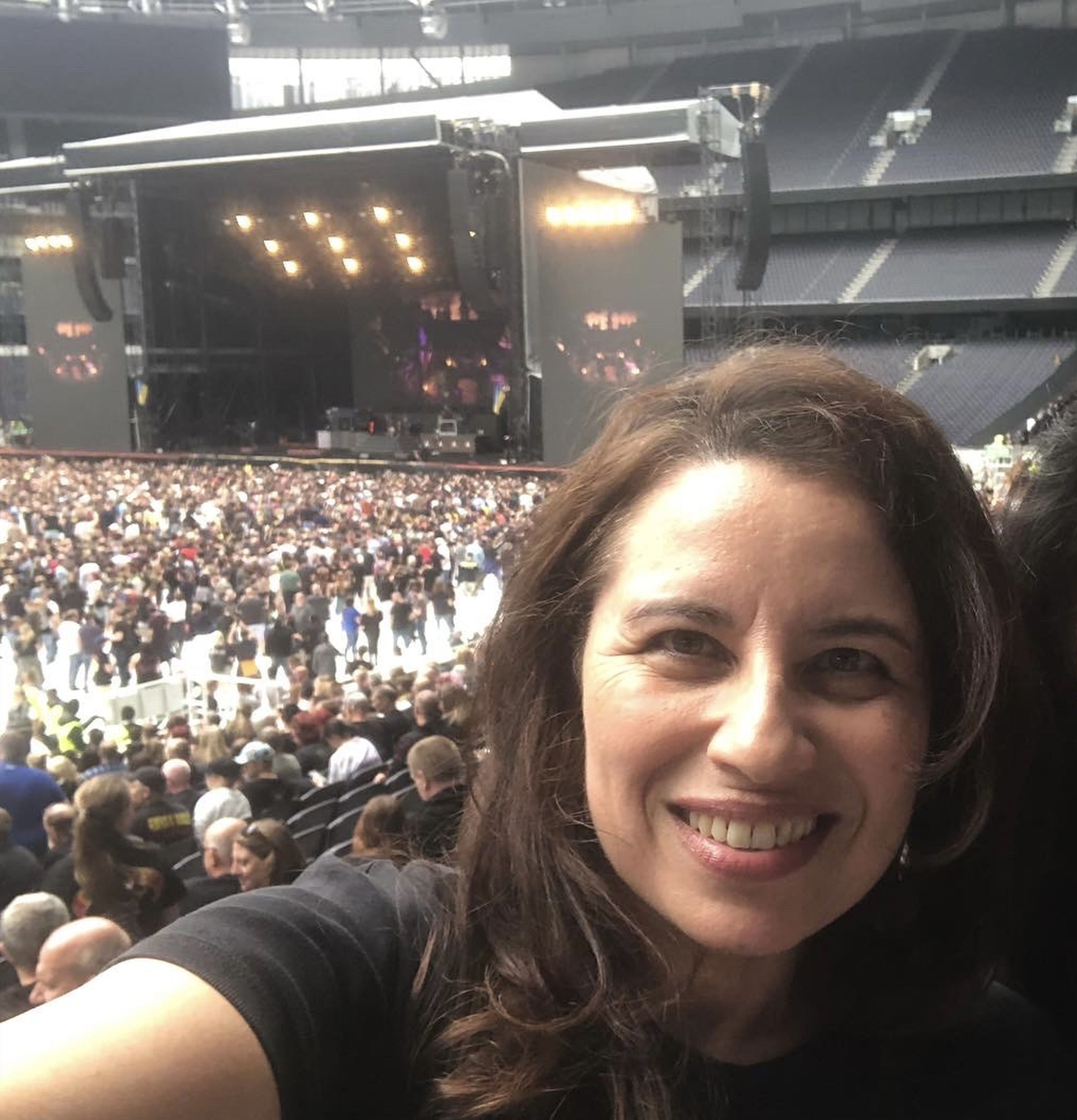It was the latest stunt in a long line of bizarre behaviour.
was performing in Vienna, when he stopped suddenly, hunched over in pain. , reportedly a rose, at the star, which hit him in the face.
The incident came a month after another shocking moment caught on video which sent gasps shuddering across the internet; as singer was giving an energetic performance in , a was lobbed by an audience member and ricocheted off her head, bouncing onto the stage floor. In a video to fans afterwards, the 33-year-old reassured everyone she was ‘good’ – but
Just days later, Ava Max was performing in LA when a fan rushed the stage, slapping her so hard he scratched the inside of her eye.
Meanwhile, performing at the British Summertime Festival, singer . A later performer saw another fan handing the increasingly confused singer a large wheel of brie.
This ongoing offbeat behaviour from fans at gigs and live performances have led many to ponder why it seems that crowds have literally gone wild.
Dr Kirsty Sedgman, a lecturer at the University of Bristol who specialises in audience research, believes there’s a number of different reasons as to why we’re seeing increasingly unhinged occurrences at performances, with one obvious driver being the current need to go viral.
‘There are tremendous pressures on younger people to produce content,’ she explains to Metro.co.uk. ‘Handing Pink a wheel of brie enables a quick five minutes of fame.’
It’s something that has prompted complaints on social media. YouTuber Tyler Oakley reposted a TikTok to his Twitter account of a subpar audience member deliberately belting out lyrics louder than the singer herself, writing: ‘The way this would ruin my entire experience, unfortunately.’

However, for Polly Arrowmsith, who previously worked as an usherette at the Hammersmith Apollo, outrageous behaviour from punters isn’t anything new.
‘We’ve always seen it at gigs,’ the 56-year-old says. ‘It’s not unheard of for people would urinate in bottles and throw them on stage. I’ve seen multiple fights in crowds.
‘People see performances as a way to let loose – they often drink too much, some may take drugs. People’s inhibitions go out the window.’
Kirsty adds that this sort of unruly behaviour actually dates back to the Ancient Greeks; Plato disapproved of noisy audiences ‘shouting or hammering their disapproval and approval – grossly exaggerated, in either case – of the things that are said and done.’
‘We also remember the famous representations of Shakespeare, throwing fruit at performers they didn’t like,’ she explains. ‘It wasn’t until the 19th century when a reverent silence was the expected norm.
‘We’ve been having these debates about whether audiences have been badly behaved for a very long time. However, the cultural industries seem to agree there has been an irrefutable shift of rowdy audience behaviour in more recent times.’
Kirsty points towards more individualistic attitudes adopted by some people in more recent years.
‘I call it the disconnection economy,’ she says. ‘We’re gradually being incentivised into thinking about ourselves and our responsibilities but only in an individual level rather than thinking about how to moderate our behaviour for the good of everybody.’

The Covid pandemic served as a catalyst for this, Kirsty explains.
‘At first, there were high levels of compliance, and a sense we’re all in it together,’ she says. ‘It then became apparent that those in power were breaking these rules with no sense of impunity.
‘Studies showed that’s when Covid compliance in the UK started to fall apart, which has resulted in this backlash of: “I don’t care of what it is I’m doing that upsets you, I’ve decided I want to behave that way, you can’t tell me what to do.”’
It ultimately results in an audience that is less considerate of those on stage, and those around them.
It’s something Furrah Syed has noticed in more gigs and performances. Attending around 30 gigs and shows a year, she has noticed some inconsiderate behaviour.

‘When I went to see We Will Rock You, I was sat behind a tall gentleman who wouldn’t stop moving from side to side,’ she explains. ‘I couldn’t see anything, and I couldn’t move myself because there were kids behind me.
‘I’ve been to open-air gigs where people will throw whole cups of beer – at least, I hope it’s beer, across the crowd. It can get a little rowdy sometimes, if people have been drinking all day. It means we have to keep our wits about us.
These more exuberant modes of participation stem from the human need for ‘collective effervescence’ explains Kirsty; the need to go out and enjoy things socially.
‘In the pandemic, we were isolated and we had little chance to go out and letting go,’ she says. ‘Theatres and concerts often serve as a social safety valve, where people can get together and let out those frustrations in a safe social space.
‘People have maybe taken things a bit too far, gotten too drunk in wanting that collective experience.’
Kirsty says that the way some shows have been marketed to audiences may also encourage certain rowdier behaviours: jukebox musicals, in particular, can sometimes be touted to audiences as ‘the best party in town’ or that audiences will be ‘dancing in the aisles’.
People have maybe taken things a bit too far, gotten too drunk in wanting that collective experience
‘This sort of sales pitch may make people believe that’s how they’re supposed to act,’ she explains. ‘But it was much more common previously that when an usher stands in, you’re much more likely to simmer down and say sorry. Now, people are having more of an instant, kneejerk response, leading to things escalating.’
It’s something that made headlines earlier this year, when a woman was ejected from the Palace Theatre in Manchester when she refused to stop singing over the musical’s flagship song, ‘I Will Always Love You’.
However, it’s not just jukebox musicals that are privy to such audience interruption. During act one of Handel’s opera Alcina, performed in the Royal Opera in 2022, a 12-year-old soprano was heckled by a baying audience member.
‘It’s a sense of entitlement,’ Kirsty explains. ‘Some people feel like they’ve paid for this experience, and want to experience it in the way they want to and don’t care if their pleasure interrupts anyone else’s ability to enjoy the show.’

For 35-year-old Thea Paraskevaides, who works in the classical music industry, she feels it’s the older crowd who embody this sense of entitlement.
‘I saw Blur at Wembley, and it was the older people there who caused the biggest problems,’ she says. ‘I remember trying to get through a crowd, and people were stood there elbowing you, saying you can’t come through.
‘I went to a punk rock gig in Brighton a few days before with mostly young people. You’d think behaviour at that sort of concert would be worse, but everyone was so friendly.’
Thea adds that perhaps the surveillance culture social media fosters may be why some younger fans are quieter, or more civilised at gigs.
‘They’re maybe more aware of being called out for bad behaviour. Younger people are aware of being filmed all the time,’ she says.
However, an active presence on social media may be why some fans feel they can reach out, touch or perhaps even attack a performer, argues Kirsty.
‘Social media means we can effectively have parasocial relationships with our favourite celebrities,’ she explains. ‘We can communicate with them at any time. They’re in our pockets, in our homes. It allows us to break through that fourth wall, when those celebrities may not even know we exist at all.’
Whether this behaviour from audience members continues for an extended period of time remains to be seen. Additional policing from ushers and security staff seems like an obvious solution, but budget constraints, as well as safety concerns for those who work in these often low-paying positions, mean this may not always be possible.
‘We also have to be careful about biases when policing behaviour,’ Kirsty adds. ‘Marginalised people tend to feel surveyed and policed even if their behaviour is exactly the same to the rich older white person they’re sat next to.’
However, regardless of what the right outcomes are to ensure everyone – audience members and performers alike – can enjoy shows, what’s happening in the theatre is effectively a microcosm of what’s happening in society at large.
‘When big socio-political situations start to bubble to the surface, they start to erupt in the theatre first,’ Kirsty says. ‘Live performance has always been a laboratory space for figuring out what it means to be together. That’s why we’re seeing this social contract falling apart here first and now it’s reflective of what’s happening everywhere.
‘We perhaps need to take a step back, look at audience norms and whether they’re still fit for purpose. We also need to see whether we manage them in practise, and what makes the arts fairer and more welcoming for everyone, so everyone can enjoy live performances.’
Do you have a story you’d like to share? Get in touch by emailing [email protected]
Share your views in the comments below.




















